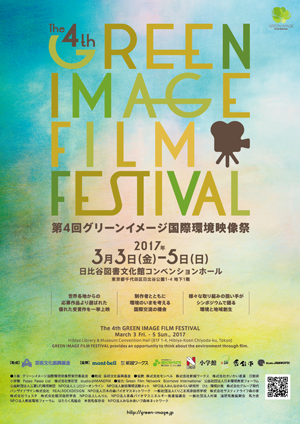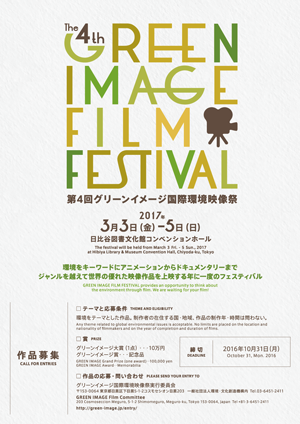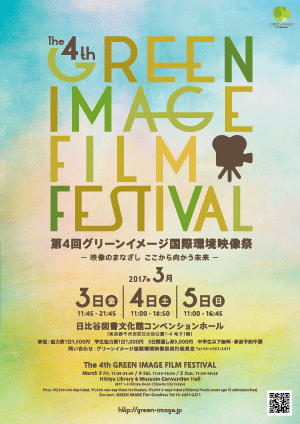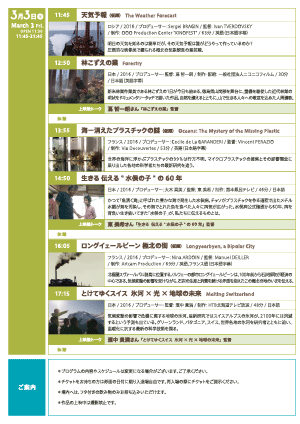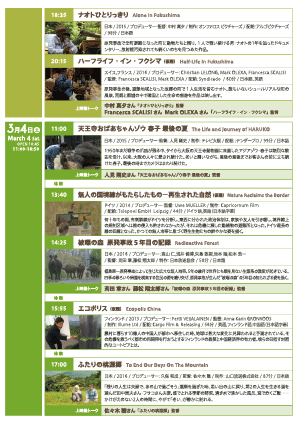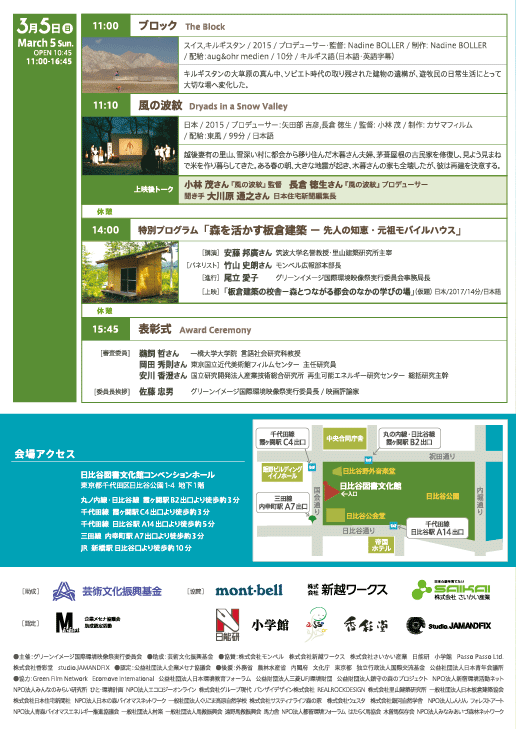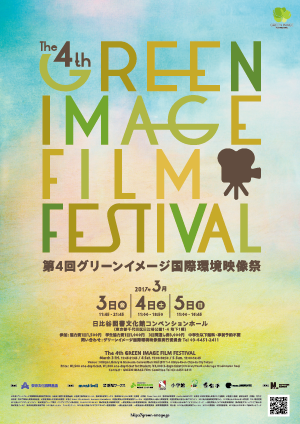Program March 4 Sat. [Open 10:45] 11:00 – 18:50
- 11:00
-
The Life and Journey of HARUKO
Japan / 2015 / Producer: HITOMI Tsuyoshi / Director: HITOMI Tsuyoshi / Production: Television Osaka / 99min / Japanese
A little after the end of the WWII, Haruko was given to Tennoji-Zoo as a gift from the King of Thailand. Since then, she has been loved by the people of Osaka for over 60 years. However, she gradually became hesitant to go out into the sunny playground and such unusual behaviors start to show. Although constant battle of her old age continued, she kept on entertaining the visitors and her caretakers stayed by her side all the way until the very end. With no frills but only the truth, this documentary portraits the love and miracle of life itself.
https://youtu.be/2Ntk5azECC8
Director’s TalkMr. HITOMI Tsuyoshi
- – Intermission –
- 13:40
-
Nature Reclaims the Border
Germany / 2014 / Producer: Uwe MUELLER / Director: Uwe MUELLER / Production: Capricornum Film / 44min / English with Japanese Subtitles
For decades, barbed wire divided Germany. It separated two political systems, families and friends and made border crossings almost impossible. In the shadow of the restricted zone, which no-one was permitted to enter, a refuge developed for threatened plants and animals. Rarities such as the black stork, otter, Wanstschrecke, which is a large grasshopper, and the whinchat have found ideal living conditions here in the marshy land, the moors, pioneer woodlands and sparse grasslands of Germany’s Green Belt. In excess of 5,000 different animal and plant species live in this unique habitat; more than 600 of them are critically endangered. Today, this former ‘no-man’s land’ is Germany’s longest wildlife corridor ? and a part of the Europe’s Green Belt. The film reveals the ways and paths wild cats, sea eagles, beavers and whinchats used to use and how they claim the former border strip for their own. Breathtaking wildlife observations and thoughtful observations of contemporary witnesses and conservationists form a fascinating bond of stories and history.
- 14:25
-
Radioactive Forest
Japan / 2016 / Producer: TAKAYAMA Hitoshi, ASAI Takehiro, YAJIMA Atsushi, IKEMOTO Tadashi, MATSUMOTO Koichi / Director: KANDA Akira, FUJIMATSU Shotaro / Production: NHK / 58min / Japanese
The Fukushima accident in March 2011 turned the surrounding villages into a desolate land. Without a human presence wildlife thrives there. Houses are torn down by wildly grown plants and black rats that gnaw wood pillars. The land is also roamed by predators like civets, macaques, and wild boars. A project is now underway to investigate the deserted areas by attaching a GPS device, dosimeter, and camera to the wild boars and record the conditions of the once Arcadian farming hills. The program also explores the first ever research of the effects of radiation on primate species.
Directors’ TalkMr. KANDA Akira, Mr. FUJIMATSU Shotaro
- – Intermission –
- 15:55
-
Ecopolis China
Finland / 2013 / Producer: Pertti VEIJALAINEN / Director: Anna-Karin GRONROOS / Production: Illume Ltd / 56min / English, Finnish, Chinese with Japanese Subtitles
When one billion rural Chinese move to cities, our planet will change irreversibly. Finnish professor Eero Paloheimo and Chinese business magnate Zhang Yue are going to save the world by reinventing the city. Their utopias are very different: Zhang plans to build the tallest and most ecological building on Earth, an Eco-city in the shape of a skyscraper, built at world record speed. Paloheimo has designed a unique clean-tech test laboratory city, and struggles to get it built in a flourishing valley outside Beijing. Is the future of urban mankind in the cherry valleys of China or high up in the sky?
https://vimeo.com/78913399
- – Intermission –
- 17:00
-
To End Our Days On The Mountain
Japan / 2016 / Producer: KUBO Kazunari / Director: SASAKI Akira / Production: Yamaguchi Broadcasting Co.,Ltd. / 87min / Japanese
After World War 2, Japan experienced an economic boom, and became a wealthy society. One couple fought against the materialism, choosing otherwise to live deep in the mountains without electricity, a telephone, or plumbing. They are Torao Tanaka (Aged 93) and his wife Fusako(88). Soon after Torao returned home from the battlefields of World War 2, he and his wife bought a mountain near their home village. Together, they cultivated the rugged terrain in order to live their lives there. Torao proclaims, “We want to plant and raise enough rice and vegetables for ourselves.” They became self sufficient. Even when Torao became serious ill, he persevered and they continued to live the mountain life. The mountain’s emotional importance far outweighed the effects of aging. Passing away, Torao’s daughters reflected on him and his wife’s lives: “We learned from them how to live good life for ourselves.” “We also want to live as our parents did.” With this, Torao and Fusako’s daughters look up to their parents as a model of how we should live.
https://youtu.be/IAdlWPG9bD4
Director’s TalkMr. SASAKI Akira
